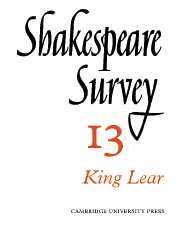Book contents
- Frontmatter
- The Catharsis of King Lear
- Lear’s Last Speech
- Albany
- Madness in King Lear
- The Influence of Gorboduc on King Lear
- Some Aspects of the Style of King Lear
- Keats and King Lear
- King Lear on the Stage: A Producer’s Reflections
- Costume in King Lear
- The Marriage-Contracts in Measure for Measure
- Tom Skelton—A Seventeenth-century Jester
- Illustrations of Social Life III: Street-Cries
- An Elizabethan Stage Drawing?
- Was there a Music-room in Shakespeare’s Globe?
- International Notes
- Shakespeare Productions in the United Kingdom: 1958
- Three Adaptations
- The Year's Contributions to Shakespearian Study 1 Critical Studies
- 2 Shakespeare’s Life, Times and Stage
- 3 Textual Studies
- Books Received
- Index
- Plate Section
The Year's Contributions to Shakespearian Study 1 - Critical Studies
Published online by Cambridge University Press: 28 March 2007
- Frontmatter
- The Catharsis of King Lear
- Lear’s Last Speech
- Albany
- Madness in King Lear
- The Influence of Gorboduc on King Lear
- Some Aspects of the Style of King Lear
- Keats and King Lear
- King Lear on the Stage: A Producer’s Reflections
- Costume in King Lear
- The Marriage-Contracts in Measure for Measure
- Tom Skelton—A Seventeenth-century Jester
- Illustrations of Social Life III: Street-Cries
- An Elizabethan Stage Drawing?
- Was there a Music-room in Shakespeare’s Globe?
- International Notes
- Shakespeare Productions in the United Kingdom: 1958
- Three Adaptations
- The Year's Contributions to Shakespearian Study 1 Critical Studies
- 2 Shakespeare’s Life, Times and Stage
- 3 Textual Studies
- Books Received
- Index
- Plate Section
Summary
Twelve years ago, in the first review of this series, Una Ellis-Fermor noted ‘certain tendencies which may prove characteristic of the post-war revaluation’. These included the revival of allegedly ‘old-fashioned’ modes of interpretation, and the reappraisal of modern approaches. Her remarks hold good, for a common feature of recent work is the continual revision of methods of inquiry, bringing both fresh rewards and relapses.
The persistence of the latter has sent John Crow1 on a rare rantipole against the vulgar errors of excess humility, of arrogance, pedantry, over-simplification, puritanism, optimism and creative subjectivity. Dry den was charged 'that I make debauch'd Persons.. .my protagonists', and Crow admits a reader's difficulty in distinguishing between 'what I say as my credo and what I invent as the ludicrous statements of honest men who hold views which differ from mine'. He believes that Shakespearian critics must be proven theatregoers, and their published work supervised by robustly humorous censorship, finding that 'The criticism of Shakespeare was formerly an attempt to give assistance to the young. Now we are forced to use it to impress our elders. What started out in life as a crutch has come to maturity as a banner with a strange device.' The metaphor finally takes to its bed with 'what seems to me a disease. I can suggest no cure.'
- Type
- Chapter
- Information
- Shakespeare Survey , pp. 146 - 154Publisher: Cambridge University PressPrint publication year: 1960



